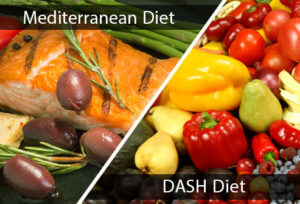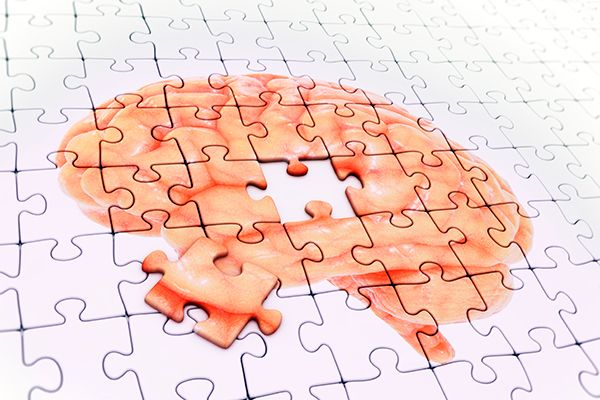The MIND Diet
 This is a combination of two diets that have well-known health benefits — Mediterranean and DASH. It’s designed to prevent or slow brain decline. Early studies show that it lowers the risk of Alzheimer’s by 53% in those who follow it closely and by 35% in those who follow it more loosely. (The name is short for Mediterranean-DASH Diet Intervention for Neurodegenerative Delay.) The recommendation was originally intended for healthy older adults, but in 2018 it was expanded to also apply to octogenarians who have had a stroke.
This is a combination of two diets that have well-known health benefits — Mediterranean and DASH. It’s designed to prevent or slow brain decline. Early studies show that it lowers the risk of Alzheimer’s by 53% in those who follow it closely and by 35% in those who follow it more loosely. (The name is short for Mediterranean-DASH Diet Intervention for Neurodegenerative Delay.) The recommendation was originally intended for healthy older adults, but in 2018 it was expanded to also apply to octogenarians who have had a stroke.
Brain-Healthy Food Groups
The MIND diet has 10 groups: green leafy vegetables, other vegetables, nuts, berries, beans, whole grains, fish, poultry, olive oil, and wine. You have to love a diet that has wine as a food group.
Protein
The diet calls for beans every other day, poultry twice a week, and fish once a week. Or make bean-and-turkey chili to eat for a few days. All these foods are high in protein and low in saturated fats, making them good for your overall health as well as for your brain health.
Vegetables and Grains
You’ll need a salad, one other vegetable, and three servings of whole grains every day. Any vegetable will do, but collard greens, kale, and spinach are especially good. Though there’s little research on brain function and grains, part of the science behind the MIND diet may include how the foods work together. Researchers are still trying to figure out why it works so well.
Snacks
Nuts and berries are ideal snacks — both have been linked to better brain health. Blueberries and strawberries, in particular, help keep your brain working at its best and may slow symptoms linked to Alzheimer’s.
Wine
Wine has been shown to improve brain health and help protect against Alzheimer’s in several studies. But the key is moderation. Typically, that’s one glass a day for women and two for men. More than that can have bad effects on brain health and may make you more likely to get dementia.
Olive Oil
It’s delicious on bread, salad, pasta, cooked greens, and any number of other things. It’s also been shown to improve brain function over the long term and protect against dementia.
Unhealthy Groups

The MIND diet specifically limits red meat, butter and margarine, cheese, pastries and sweets, and fried or fast food. You should have fewer than 4 servings a week of red meat, less than a tablespoon of butter a day, and less than a serving a week of each of the following: whole-fat cheese, fried food, and fast food.
The Worst Foods for Your Brain
Dietary Don’ts
You’ve been loading up on colorful berries, nibbling on nuts, and dining on salmon — all good moves if your goal is better brain health. But what about foods that might raise your risk for mood or memory problems, especially as you get older? Find out which potentially problematic items should make fewer appearances on your plate (or disappear altogether).
Margarine and Frosting
These foods, along with many packaged snack foods, are high in trans fats. You may know that trans fats aren’t good for your heart and blood vessels. Research has found that they may also wreak havoc on brain function. A study from the journal Neurology found that older adults who had the highest levels of elaidic acid (a common type of trans fat) in their blood were the most more likely to develop dementia.
Alcohol
While a single glass of wine or beer is unlikely to mess with your mind, alcohol directly affects the brain’s communication pathways. The more you drink, the more difficult it may be to process new information or remember things. Alcohol may also make you feel confused or depressed.
Soda and Other Sugary Drinks
If you want to keep your brain sharp as you age, steer clear of super-sweet drinks. Research has found that people who drink a lot of soda, sweet tea, and other sugary beverages are a lot more likely to have memory trouble. These drinks, which often have a type of sugar called fructose, might even cause certain parts of your brain to become smaller.
Diet Sodas and Drinks With Artificial Sweeteners
If regular soft drinks are bad for you, then sugar-free ones are good, right? Not so fast: Research finds that people who sip at least one diet soda a day are nearly three times as likely to have a stroke or develop dementia. Scientists think that artificial sweeteners may be the offending ingredient.
French Fries and Other Fried Foods
People who eat a lot of fried, processed foods tend to fare worse on tests that measure their thinking skills. The likely reason: fried and fatty foods. These guilty pleasures cause inflammation, which can damage the blood vessels that supply the brain with blood and hurt the brain itself.
Doughnuts
These tasty treats are both fried and loaded with sugar, a bad combo when it comes to brain health. You get an inflammation double-whammy from the deep-frying process and the excess sugar. Studies have linked high levels of sugar in the blood with dementia. Even worse: Most doughnuts contain trans fats, another ingredient your brain doesn’t need.
White Bread and White Rice
Refined carbohydrates, even ones that don’t taste super sweet, can spike your blood sugar. That’s often followed by a crash, which can make you feel mentally foggy. Research shows that too many refined carbs may increase your risk of Alzheimer’s disease, especially in certain people who are genetically predisposed to it. Go for whole-grain bread, brown rice, and whole-wheat pasta when you eat carbs.
Red Meat
It’s high in saturated fat, which is bad for your heart as well as your brain. In fact, limiting red meat is a key tenet of the MIND Diet, a research-based eating program aimed at keeping your memory and thinking sharp. Want a protein source that’s better for your brain? Fish, lean poultry, and beans are healthier options.
Butter and Full-Fat Cheese
That creamy taste comes at a cost. These dairy products are full of saturated fat. Followers of the MIND diet avoid butter, cheese, and other full-fat dairies. When it comes to brain health, low-fat dairy is generally the healthier choice. You can get milk, yogurt, cottage cheese, and other dairy foods in low-fat forms.
Swordfish and Ahi Tuna
Most health experts are big fans of fish, but the kind they love is salmon and others that contain a healthy fat called omega-3 fatty acids. Swordfish, ahi tuna, and other big fish lose points because they tend to be high in mercury. That’s a neurotoxin — meaning toxic to your brain — that may lead to a higher risk of memory loss and poorer thinking skills in older adults.
Bottled Dressings, Marinades, and Syrups
Read the ingredients on the label carefully. Many of these products have surprisingly large amounts of high-fructose corn syrup. That’s the same stuff that’s in soda. It’s linked to a variety of health problems, including memory loss and a decline in brain performance. Try mixing up your own salad dressings instead.
Reviewed by Jennifer Robinson, MD / This tool does not provide medical advice.



Wow, good info, can never get to much info to keep your mind sharp! Thanks